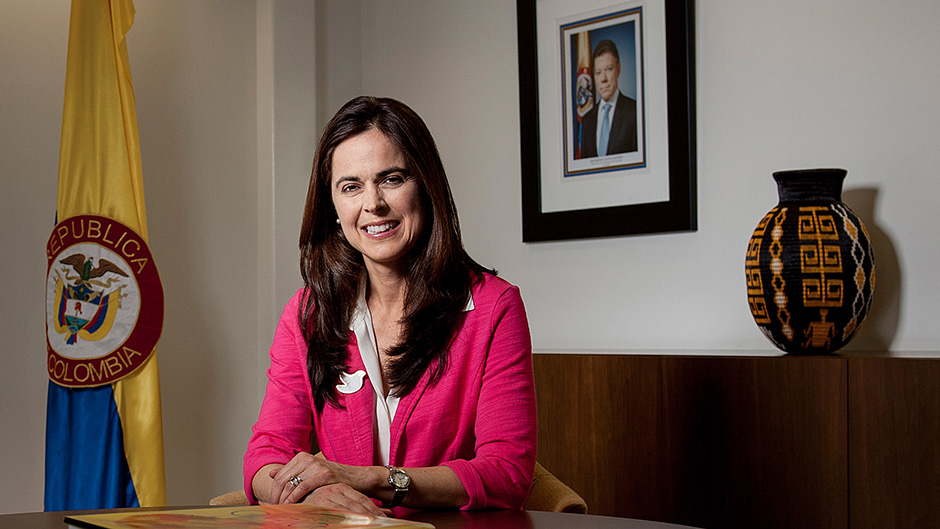Born just a few years after the Revolutionary Armed Forces of Colombia launched its left-wing insurgency in 1964, Elvira Maria Restrepo has never known her homeland without war. But today, the University of Miami assistant professor of geography and regional studies, who is advising Colombian President Juan Manuel Santos on his historic peace accord with the FARC, can already see the peace dividends.
“For the first time in my life, the main military hospital in Bogota has empty beds,” Restrepo said, as Colombia’s October 2 national referendum on the peace agreement approaches. “We have zero combat dead, zero kidnappings, zero towns taken over. The cease-fire has led to a negative peace—an absence of violence for many people who have lived with the conflict throughout their lives.”
Yet, as Colombians in the Andean nation, and across the world, including those in South Florida, gear up for the unprecedented ballot measure, Restrepo is troubled by the absence of celebrations on August 24, the day when, after nearly four years of negotiations, the government and the FARC pre-signed the final agreement to end the bloodshed that has claimed an estimated 220,000 lives over the past half century.
“It’s the most remarkable achievement in the recent history of Colombia and we already have seen some of the benefits of peace, but people did not celebrate,” Restrepo said. “Which tells me how completely polarized Colombia is, and where my work is and where my work will start even if we win the plebiscite. This is the fourth and only successful negotiation with the FARC in 30 years.”
(Learn more about the plebiscite at Storer Auditorium on Wednesday, September 28, from 11:45 a.m. to 2 p.m., when International Studies Professor Bruce Bagley moderates a discussion on Colombia’s Peace Process with Restrepo and seven other panelists.)
An expert in Colombia’s politics and justice system who holds a Master of Laws from Harvard and a Ph.D. in politics from Oxford, Restrepo does not expect the plebiscite to fail. But should it, her advisory role will intensify, not cease.
Driven as much by her scholarship as her passion, she knows that building a lasting peace through any mechanism will depend on societal reconciliation—on opening the minds of a people deeply divided by their interests and over deeply emotional issues, including allowing FARC members into the political mainstream.
As such, she is spending her year of public service leave from the University developing interactive public forums and a virtual platform to help Colombians reduce long-held prejudices by debating, deliberating, and understanding the conflict from different perspectives. “Maybe they don’t want the FARC in Congress, but maybe the way to accomplish that is not to vote for them. Isn’t a demobilized FARC aspiring to Congress better than FARC using violence to reach their political ends?” Restrepo asked.
She is just as certain that the nearly 8 million Colombians who have registered as victims of the half-century civil conflict between left-wing guerrillas, right-wing paramilitaries, and the Colombian government seek truth, not revenge.
“They want to know: Where are my daughter’s remains? How did you recruit my son—was he coerced, or did he volunteer?”’ she said. “The great majority of conflict victims, not only in Colombia but across the world, prefer truth over retribution. Truth helps healing and allows them to move forward.”
In 2014, hoping to move the peace process forward, Restrepo and some UM colleagues wrote an open letter that, signed by 130 scholars around the world, urged support for the ongoing negotiations with the FARC. In what would prove ironic, the letter noted that Santos’ immediate predecessor as president, Alvaro Uribe, established the “route to peace” in 2005 when he negotiated the demobilization of the country’s paramilitary groups—“under great secrecy, few rules and, ultimately, no democratic approval process.”
Today, that agreement, which was revised, enhanced, and enacted into law by Colombia’s Congress, courts, and civil society, has produced what Restrepo calls undeniable gains: a dramatic decrease in violence, the revelation of key truths about the country’s bloody conflicts, and significant economic growth.
Yet, contributing to the nation’s polarization and confusion, Uribe and his predecessor, Andres Pastrana, who conducted three years of failed negotiations with the FARC, are among the most vocal critics of Santos’s agreement. They argue, in part, that the accord rewards FARC leaders with impunity.
Restrepo disagrees, and hopes Colombians will be able to learn the truths and ignore “the noise.”
In addition to collecting and sharing the truth about the 220,000 deaths and other crimes against humanity, the agreement gives survivors the right to reparations and to a special justice, the goal of which is to repair wrongdoings through community service. For example, she says, rebel leaders who destroyed villages or laid land mines can avoid prison by confessing their crimes and reconstructing the villages, or retrieving the explosives.
And that, Restrepo says, makes Colombian’s innovative peace accord a model for the world, one as uniquely challenging to implement as it is unprecedented.
“The question remains: Can the Colombian state redress the lives of 8 million victims, or approximately 15 percent of the population? Probably not,” she said. “This is why civil society needs to be involved. No peace agreement on its own could reconcile a society that is so deeply divided that it is still debating whether to approve an agreement aimed at ending the longest conflict in this hemisphere.”

